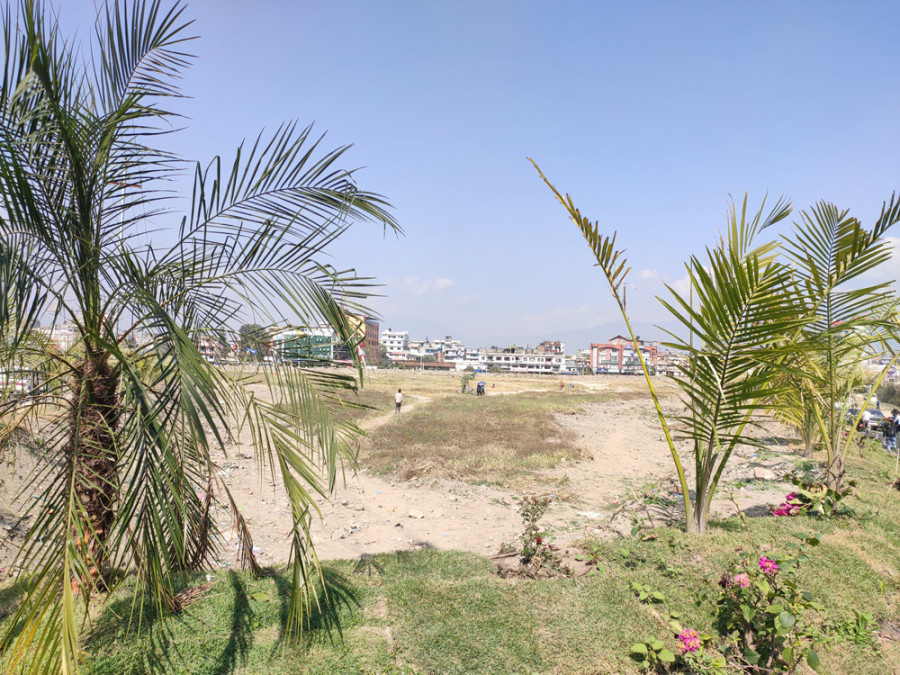Kathmandu
Tinkune ‘park’ becomes a new haven for drug users, prostitution and hooligans
The grass-and-mud embankments built to shield Xi Jinping from the derelict state of the Tinkune grounds have allowed illicit activities to flourish, police and locals say.
Anup Ojha
A green facade that the city authorities cobbled together overnight to hide the derelict grounds at Tinkune in Kathmandu during Chinese President Xi Jinping’s visit has become an object of public ridicule. Many lampooned the fact that the facade was a fitting encapsulation of the superficial beautification the city went through during Xi’s visit, only for everything to be abandoned once he had left. But now, weeks after Xi’s visit, for locals, the derision has turned into concern.
“The city authority basically built a wall to block the view of the field. But that space now has become a place for drug users, sex workers and ruffians,” said Abinash Parajuli, a local.
Even the police admit that Tinkune park, which is barely a mud pit surrounded by mounds of grass-covered dirt, has become a hub for illicit activities.
“We have noticed third-gender prostitutes from Durbar Marg and Thamal coming here at night with their clients ever since the green facade was constructed. We’ve been chasing them away,” said Dirgha Bogati, an inspector at the Tinkune Metropolitan Police Circle Tinkune.
Kathmandu Metropolitan City, in the second week of October, had surrounded the 50 ropanis of open land in Tinkune with a raised grass embankment with flowers and plants in an effort to make it look like an actual park. The ground, which lies on the road to the country’s only international airport, had turned into a parking lot for trucks and buses for over two decades, mired in competing compensation claims.
The embankment continues to serve its purpose—to hide the derelict inner space from outside view. But sheltered from prying eyes, people have taken to defecating and urinating inside, among other less savory activities.
“The inner part has become a haven for illegal activities by drug users and prostitutes, as it is easily accessible to everyone and nobody can see inside the park during the evening,” said Parajuli.
The city authorities are aware of the ground’s current usage but there is little they can do, they say.
“This is just cosmetic beautification. We could not build a park inside because the landowners have yet to be paid compensation for their land,” said Kedar Neupane, chief executive of Kathmandu city. “I have heard that over half of the landowners have received compensation.”
The city spent Rs 3 million for the aesthetic enhancement and every morning, the city office waters the grass and plants with two tankers full of water. According to Neupane, the Agriculture Development Bank, Rastriya Banijya Bank and Nepal Bank were all once interested in building a proper park but nothing has materialised yet.
But the large patch of mud and dirt was an eyesore and thus, every time foreign dignitaries visit the country, it gets covered up.
In 2014, during the 18th SAARC Summit held in Kathmandu, the grounds were shielded with large zinc plates, all of which were stolen immediately after the summit.
Again, in late August, during the 4th Summit for the Bay of Bengal Initiative for Multi-Sectoral Technical and Economic Cooperation, Tinkune was surrounded with plastic siding with pictures of the country's heritage, mountains, and fauna. Once the summit was over, the siding was ripped apart by hooligans.
Again, immediately after Xi had departed Kathmandu, flowers, plants, and even pieces of carpet grass laid on the embankments were stolen.
“This makes a mockery of us,” said Rajan Gautam, a resident of Shantinagar, which adjoins Tinkune.
The illicit activities taking place inside the grounds are public knowledge but even local authorities appear clueless as to what needs to be done.
“As a resident of the area, many locals ask me for a proper solution for Tinkune,” said Nawaraj Parajuli, chairperson of Ward-32, that includes the Tinkune grounds. “All we can do is ask the police to take action. The rest is up to the city.”




 11.19°C Kathmandu
11.19°C Kathmandu.jpg)











